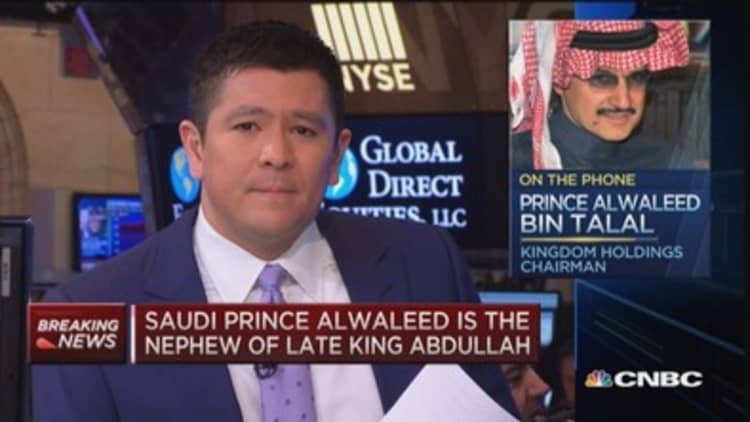While Saudi Arabia handles the transition to a new king and ignores pleas from other oil-producing countries to cut crude production, the kingdom is watching an escalating crisis on its southern border that could have implications far beyond the region.
Yemen's prime minister and president resigned last week amid a rebel takeover of much of the country of 25 million. Houthi rebels, backed by Iran, have further destabilized the nation, which was already embattled by Al-Qaeda in the Arabian Peninsula (AQAP). The developments are of importance to global markets and security, experts said, even though Yemen is not a major oil producer.
"Unlike a lot of threats which are distant to some extent, this is an immediate threat," said Anthony Cordesman, the Arleigh A. Burke Chair in Strategy at the Center for Strategic and International Studies.
There are several problems with instability in Yemen from a regional perspective. The impoverished country is facing an impending humanitarian crisis as violent factions vie for control amid the backdrop of a diminishing water supply, according to Beth Grill, a Middle East analyst for the Rand Corporation.
Secondly, Yemen—which was already the seat of AQAP's anti-Western terror operations—could provide an even better home base for terrorists now that the internationally recognized government is on the run.
The administration of President Abed Rabbo Mansour Hadi has been generally willing to provide intelligence assistance for U.S. strikes within his borders, but questions are now rising over whether those will be as frequent or effective in the absence of a functioning government.
Read More Draining the swamp of support for terrorism
"This is the one country where Al-Qaeda in the Arabian Peninsula has really put an emphasis on attacking American targets," Cordesman said.
Yemen also occupies an important strategic position on the Red Sea and Gulf of Aden, holding a position adjacent to a shipping lane that is one of the world's busiest and handles the flow of all ship-borne Gulf oil.
"Control of that area is important to the region and the world," Grill said.
More worries for Saudis

But the most important effects of a destabilized Yemen could be on the Saudis just to the north.
The Houthi rebels present a problem to the kingdom, as the newly crowned leadership in Riyadh worries about being flanked on several fronts by Shiite Iran, Cordesman said.
"Clearly, we have seen the hands of Iran infiltrating that country through its blatant and open support of the Houthis there," Saudi royal and investor Prince Alwaleed Bin Talal told CNBC last week.
He called it an "unfortunate situation" as Yemen's political vacuum could become a "seat of trouble" in the region.
Read MorePrince Alwaleed: Oil will never see $100 again
Beyond concerns related to Iran, any humanitarian crisis along the Saudis' borders could make the authoritarian regime in Riyadh nervous about stability on the peninsula, experts said. The Saudis have watched one allied Arab state after another become destabilized over the last few years, and are now watching that chaos migrate to a country that shares their peninsula.
For now, Saudi Arabia has largely taken a "wait-and-see" approach to Yemen, Grill said, adding that the country was even tapering off its support of the Hadi government in recent months as the tenuous political situation began to worry Riyadh more.
Read MoreSaudi oil policy 'just took turn for the worse'
"Saudi Arabia is still weighing their bets; they don't know how they're going to deal with it," she said, adding that the next test of the situation in Yemen will be if the rebels actually accept Hadi's resignation—many observers thought the Houthi only hoped to gain influence, not lead a government, she explained.
This state of affairs may not last, however, as Saudi Arabia's new leadership will likely take a more hawkish approach than under former King Abdullah, said John Kilduff, founder of Again Capital.
"While Abdullah was prone to exercise restraint—to a degree—and patience, I don't see [new Deputy Crown Prince Mohammed bin] Nayef doing that," Kilduff said.
Yemen's ultimate fate is not a forgone conclusion, experts said, as stability could potentially be found with sufficient mediation and international aid. But the more likely scenarios is a prolonged "Somali-type" civil war, Cordesman predicted.
The country could end up splitting along a north-south divide, he said, but this would not guarantee any end to drawn-out violence. Ultimately, the region's best hope might be war weariness.
"You don't always get mediation or dialogue, but you often do get burnout," Cordesman said. "That's often a bad situation, but it's better than no burnout."


